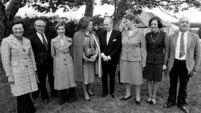Mayo missionary died in notorious Korean massacre in 1950
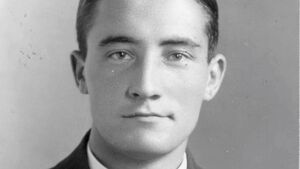
Fr Jack O'Brien who served in World War II before dying in captivity during the Korean War.
September 24th marks the 75th anniversary of the Taejon Massacre in South Korea where approximately 1,000 people were brutally killed by Communist forces. Among the victims were three Columban priests, one of whom was Fr Jack O'Brien, who had strong ties to Co Mayo.
John (Jack) O’Brien was born on December 1st, 1918, in Donamon, Co Roscommon, the eldest of the four children of T.J. O’Brien and Mary Elizabeth Hegarty. T.J. worked as a station master with the Midland Great Western Railway, and the family moved in line with his promotions.
Jack began his primary schooling in Killala in North Mayo, and, by 1925, was attending Ballinrobe National School. In 1931, the family relocated to Ballaghaderreen where Jack continued his education at St Nathy's College.
In 1936, Jack joined the Society of St Columban and was ordained priest on December 21st, 1942. A week later, he celebrated his first Mass in Claremorris where his father had worked since 1940.
Unable to take up an overseas missionary post due to wartime travel restrictions, Fr Jack instead served as an army chaplain with the 2nd Battalion of the Royal Ulster Rifles. On D-Day, June 6th, 1944, under relentless shell and mortar fire, he landed with his battalion on Sword Beach in Normandy. Over the next ten months, they advanced through Northern France into Belgium and Holland, eventually reaching Bremen in Germany.
In November 1944, Fr. Jack wrote: "Our casualties have been very heavy indeed, and I need not tell you that there are very few of the original lot left."
His comrades joked that he must have been well in with his 'Boss' above to have made it through the campaign unscathed. His commanding officer, who held him in high regard, praised his “perennial cheerfulness”, calling it “the salvation of many a drooping spirit in the difficult days which confronted us”.
World War II ended in 1945. However, due to ongoing travel restrictions, Fr Jack remained with his battalion until 1948, serving in Egypt, where Britain maintained a military presence to safeguard the Suez Canal and Palestine, which was then under British administration.
In 1948, he was recalled to take up his long-awaited missionary post in Mokpo, on the southwestern tip of South Korea. There, he served under Fr Tommie Cusack of Ballycotton, Co Clare. Also stationed in Mokpo at the time was Irish-American Monsignor Patrick Brennan, the Prefect Apostolic of Kwangju. Thousands of miles from home, Fr Jack looked forward to his weekly read of the .
Then on June 25, 1950, the Communist-backed North Korean People's Army launched a sudden attack on the West-backed Republic of South Korea, triggering the Korean War.
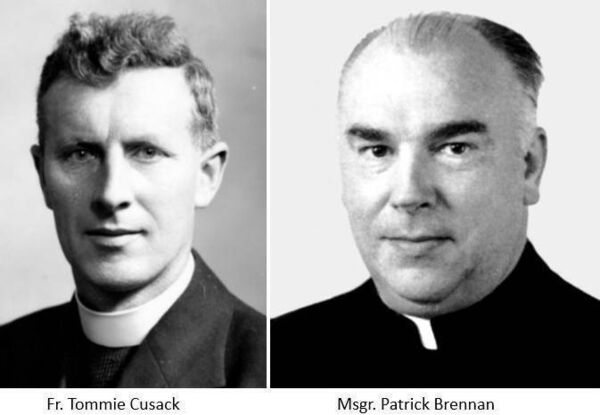
Initially, Fr Jack was not concerned. The warzone was over 320 kilometres away, separated by mountainous terrain, and he believed the conflict would be short-lived. However, on July 17th, the United States Command dispatched an envoy to Msgr Brennan, strongly advising the Columban missionaries to evacuate to the port of Pusan, where safe passage to Japan could be arranged.
Msgr Brennan felt it was his duty to remain with his flock and made it clear that Fr O'Brien and Fr Cusack were free to leave. When he realised that both men intended to stay, he was overcome with emotion and deeply moved by their shared commitment to their parishioners.
The North Korean forces reached Mokpo on July 25th. Anyone associated with the Catholic Church was viewed with suspicion and branded a spy. Unsurprisingly, on August 4, the three Columbans were arrested. They were imprisoned in the local jail for a week before being transferred, under armed guard, to the military stronghold at Kwangju. There, they faced accusations of espionage, anti-Communism and living as parasites off their parishioners. After intense interrogation, they were thrown into a cramped police cell.
One night, three American prisoners, one of whom was Lieutenant Alexander G. Makarounis, were thrown into the cell with them. Although neither group could see the other in the dark, they began to chat. From the "brogues“ of Fr O’Brien and Fr Cusack, the Americans guessed that two of the men were Irish. The three Columbans shared their blankets with the three newcomers. It was only in the morning light when the soldiers saw the smiling, friendly faces of their cellmates, that they realised they were three Roman Catholic priests.
To lift spirits and pass the time, Fr Jack often entertained his fellow prisoners with songs. When he sang , first released by Bing Crosby in 1948, a cloud of homesickness descended upon them. On one occasion, he even danced an Irish jig for them.
Whenever American planes flew overhead, strafing and bombing the surrounding area, the three priests turned to silent prayer. The Americans believed that Divine intervention, through these prayers, kept them safe during this period.
Then, one night without warning, all six men were ordered onto a truck. It was overcrowded, leaving them packed tightly with barely room to breathe as they sped along rough, winding mountain roads. The guards would jab at the prisoners with rifles and click the chambers ominously, as if preparing to fire. Then they would burst into cruel, mocking laughter at the fear in their captives’ eyes and discharge their guns into the air.
They travelled for three nights, with the truck moving under the cover of darkness to avoid detection by Western forces. Each morning, they were thrown into a cell and given a rice ball to eat. Despite huddling together for warmth, they were always cold.
Just before dawn on the third night, the truck broke down about twelve kilometres outside Taejon. The prisoners were forced to march the remaining distance. Msgr Brennan and Lieutenant Makarounis struggled to keep up with the fast pace. Fr Jack assisted Makarounis while Fr Tommie supported Msgr Brennan. It was critical to keep everyone moving, as the guards threatened to shoot anyone who fell behind.
As they approached a river, light bombers appeared overhead, sending everyone scrambling for cover under a nearby bridge. In the chaos, Msgr Brennan slipped on the rocks leading down to the water. Fr Jack reacted quickly, grabbing his hand, and pulling him back to safety before he could be swept away.
Once the bombers had dispersed, they resumed their journey at a faster pace. However, Makarounis and the Monsignor were unable to keep up. When a guard signalled to the two men to step aside, they expected to be executed. Msgr Brennan bowed his head in silent prayer, but in a rare moment of mercy, the guard indicated they could slow down. Eventually, all six men arrived at Taejon, weakened by hunger, thirst and fatigue. That night, the American soldiers were moved elsewhere. After the war, they spoke fondly of the courage, positivity and deep faith of the Columbans.
In Taejon, the three priests were imprisoned at a Franciscan Monastery where the wife of a Korean judge was also detained. She later recounted that whenever someone was taken out for torture or interrogation sessions regarding Catholics in Taejon, “the three foreign priests went down on their knees and prayed throughout the night for that prisoner”.
The monastery served as the temporary headquarters for the North Korean Forces. Each time there was an air raid by American forces, the Western prisoners were ordered onto the roof to act as human shields, to deter bombing. On September 15th, United Nations forces, led by American General Douglas MacArthur, the commander in the Far East and Japan, executed a daring amphibious attack on Incheon, a town located on the northwest coast of South Korea. They recaptured Seoul and sent troops southward towards Taejon to block Communist troops from rushing northwards to retake the South Korean capital.
On the night of September 24th, the North Korean army was forced to retreat up the Korean peninsula to avoid being cut off by advancing United Nations troops. Before they withdrew, they massacred about 1,000 prisoners. Among those executed were the three Columbans. The blood-splattered and bullet-riddled walls of the monastery bore witness to the brutality of their deaths.
The priests were reported missing on October 18th. A month later, Fr Jack's parents received the dreaded telegram - “I regret to inform you...”, confirming their worst fears.
Fr Jack is one of seven 'Korean Martyrs' who were declared Servants of God in 2014 – a title granted to individuals at the first stage of canonisation. They were all members of the Columbans who died during the Korean War.
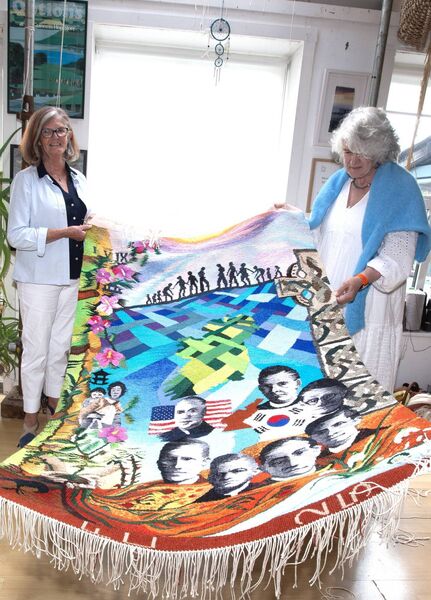
***
Vincent, Fr Jack’s younger brother, was born in Killala in 1923 and ordained a priest for the Columban order in 1947. He spent about 20 years serving in the Philippines, where, like his brother, he stayed connected to home through his weekly copy of the . After returning to Ireland in 1969, he ministered in Ballinrobe before being assigned to Bunnacurry, Achill, where he was regarded as a gentleman of wit, charm and courtesy.
With his great energy, innovative spirit and ability to motivate people, Fr Vincent played a crucial role in addressing the unemployment crisis on the island. He secured grants from Gaeltarra Éireann to establish several small businesses in two schools that had closed in Bunnacurry. Under the umbrella of Údarás na Gaeltachta, he also promoted employment through small, locally-driven indigenous projects generated by the people of Achill.
He made a significant contribution to the development of soccer in the region. In recognition of his efforts, the Fr Vincent O’Brien Memorial Cup, FAI Junior Cup for the Mayo Area, was established in his name. Fr O’Brien Park, the home ground of Achill Rovers, was named after him.
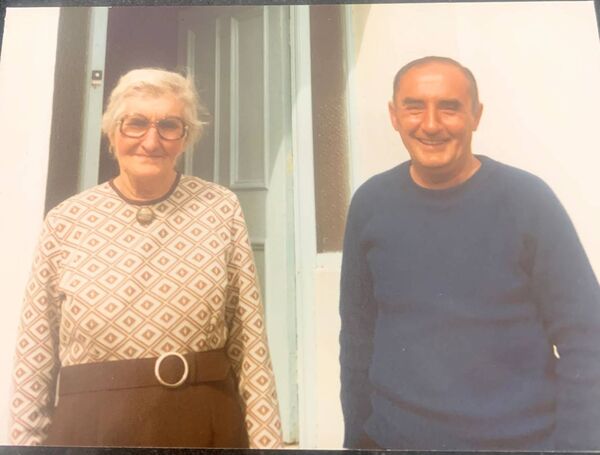
Fr Vincent served as the President of the Mayo Association Football League. A keen golfer, an annual match play competition is played in his memory at Achill Golf Club.
News of his death was received with great sadness in 1984. The warm affection with which he was regarded was evident at his funeral in Dalgan Park, Navan, when over 200 people travelled from Achill to pay their respects.


